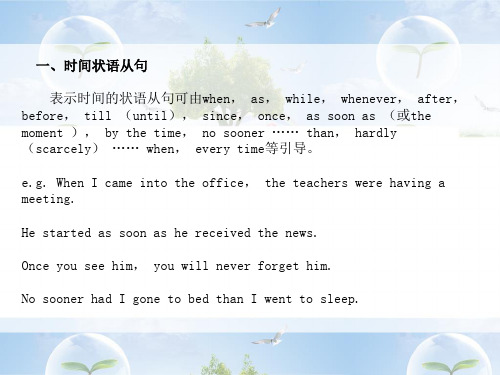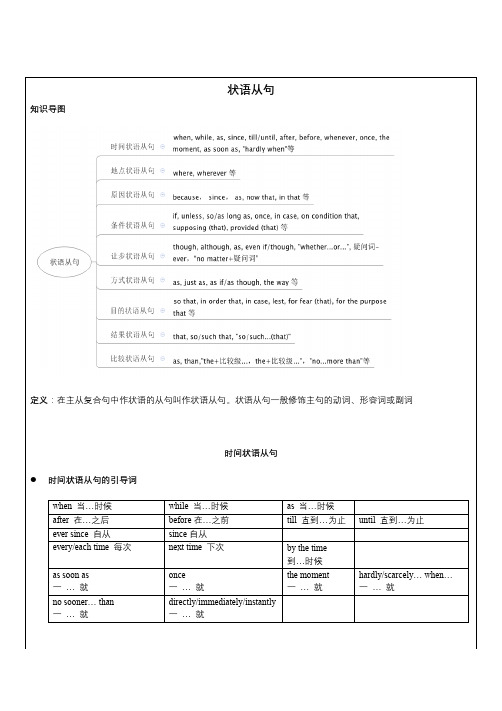状语从句讲解
英语语法讲解状语从句

Whatever ( = No matter what ) you say, I'll never change my mind.
八、方式状语从句
方式状语从句常由as, as if (though), the way, rather than 等引导。
You can go swimming on condition that ( = if ) you don't go too far away from the river bank.
If he had come a few minutes earlier, he could have seen her.
e.g. He is disappointed because he didn't get the position.
As it is raining, I will not go out.
Now that you mention it, I do remember.
三、地点状语从句
引导地点状语从句的连词是where 和wherever等。 e.g. Sit wherever you like. Make a mark where you have a question.
一、时间状语从句
表示时间的状语从句可由when, as, while, whenever, after, before, till (until), since, once, as soon as (或the moment ), by the time, no sooner …… than, hardly (scarcely) …… when, every time等引导。
(完整版)状语从句的讲解最全的状语从句讲解

状语从句的讲解就是用一句话作状语分为:时间,地点,方式,原因,结果,条件,让步,目的,比较一、时间状语从句第一次见到你一见到你我就喜欢上了你直到见到你五岁时见到你When, as, while, before, after, since, till/until, as soon as no sooner…than…scarcely…when…hardly…when… the minute the second the instant the moment by the time 截止 immediately instantly directlyeach time every time next time the first time on doing sthwhenwhile 当…时as1。
when 1)当…时/ 延续性动词短暂性动词都可用2)这时/3)届时、到时I was watching TV when my cellphone suddenly rang这时When I was five years old I could speak five languagesThe wet weather will continue tommorow when a cold front is expected to arrive届时到时注意:时间状语从句中动作发生有前后时先发生的用过去完成时When my mother came back I had already gone to bed.2。
while 1)从句动词延续性2)同时发生3)对比的意味“然而”4)趁着He taught himself while he worked in a bank 延续性动词当他在银行上班时While we were working they were having a rest.对比While they were having a discussion , they got very confused。
状语从句知识点详解(初中英语专项复习)14

状语从句知识点详解(初中英语专项复习)状语从句的概念: 用一个句子作状语来修饰动词和形容词,以表明动作发生或状态存在的时间、地点、原因等,这个句子就叫做状语从句。
状语从句的分类:状语从句共分为九大类,包括:时间、地点、原因、条件、让步、目的、结果、方式、比较状语从句。
下面分别讲解:一、时间状语从句概念:用来表示时间的状语从句,由when, while, as, till, until,before, after, since等引导。
由于时间状语从句的引导词所表示的意思并非一致,不同引导词表达不同的时间,它们在句子中对应的时态、语态等也有所不同。
例如:when /while引导的时间状语从句when引导的从句的谓语动词通常是瞬间动词,也可以是延续性动词。
从句动作可与主语动作通常先后发生也可同时发生。
I was writing when my sister came back.( come是瞬间动词,只能用when引导,不能用while)He often wrote me when/while he studied in Shanghai International Studies University.( study 是延续性动词,while可代替when)While my mother was cooking , I was playing chess with dad. (cook是延续性的动词,cook和play同时发生)I like playing chess while my sister likes reading stories.我喜欢下棋,而我姐姐喜欢看小说。
(while表示对比)when和while的区别还有:while引导的时间状语从句多用于进行时态,而when引导的时间状语从句多用于一般时态。
While we were playing games, our headmaster called me .我们正在做游戏的时候,校长叫我了。
高中英语--状语从句专题讲解(详细)

注:
“no sooner…than…”,“hardly…when…”引导时间状语从句时,主句用过去完成时,从句用一般过去时。此外,当把no sooner, hardly/scarcely提到句首时,主句用部分倒装。
as意为“随着,一边…,一边…”,常有以下用法:
a)用于表示两个动作同时或者几乎同时发生。
b)表示两个发展变化中的情况。
c)表示在某事发生的过程中另外一件事发生。
d)表示随着短暂动作的发生,另一动作立刻发生。
before和after引导的时间状语从句
before意为“在…之前”,表示主句动作发生在从句动作之前。
=I hardly told him the news when he stopped listening.
地点状语从句
地点状语从句的引导词有when和wherever。
where, wherever指具体地点时,从句可用于主句之前或之后;
where, wherever表示抽象概念的含义时,从句需放在主句前。
When hehad finishedhis homework, hetooka short rest.(先发生+后发生)
When Igotto the airport, the guesthad left.(后发生+先发生)
注:
when还可表示原因,意为“既然”,引导原因状语从句;也可以用作并列连词,意为“就在那时”,常构成如下结构:
A number of high buildings have arisen where there was nothing a year ago but ruins.(where表示具体地点)
英语语法讲解状语从句

EG:
• He is absent today because he was ill. • As it is snowingwe shall not go out. • You couldn’t see him for he
wasn’t there.不句首 四. Since you are ill I will go alone.
because as since for
•
语气
because 最强
as
较强
since 较弱
for
最弱
位置 前或后
前 前 后
意义
原因;表客观因果关系;回答 由于;把众人所知的事实当作理由
既然;就对方陈述的事实作为理由 理由;对某一事实进行推断的理由
注:上面所说的ughter returned home last night. 昨晚母亲等到她的小女儿回家才睡 觉
表示地点
二、地点状语从句
引导地点状语从句的主要有:where wherever及- where构成的复合词
EG:
1. We shall go where people are kind.
表示结果
• 四、结果状语从句
可以由 • so that • so...that • such...that
so that so…that such…that
• so that 以便、结果表目的和结果 注意:在从句中有情态动词表目的无情态动词表 结果 so…that 如此的…以致于表结果该结构常见于: 一.so+形/副+that 二.so+形+aan+单数名词+that 三.so+many/much+复数名词不可数名词 +that
C. However is he late
状语及状语从句(语法加练习完整讲解).ppt

4.动词不定式(或不定式短语): He went to see a film .他看电影去了。 My father was surprised to hear the news . 我父亲听到这个消息,感到惊奇。
5.分词(短语): He sat there reading a novel . 他坐在那儿看小说。 The students went away laughing. 学生们笑着走开了。
2023最新整理收集 do something
The Adverbial 状语
ห้องสมุดไป่ตู้ 一、什么是状语
修饰动词、形容词 、副词或整个句子 ,说明 动作或 状态特征的句子成分,叫做 状语。
1. 状语修饰动词 Silently she went away. 她悄悄地走开了。
2. 状语修饰句子 Sadly, he will not be there. 令人伤心的是,他将不会在那里了。
The Adverbial Clauses 状语从句
从状种九
时间状语从句 地点状语从句 原因状语从句 条件状语从句 让步状语从句 结果状语从句 目的状语从句 方式状语从句 比较状语从句
时间状语从句
I will discuss this with you when we meet. 我们见面时再与你讨论这件事。
(2)如果动词前有一个或几个助动词,状语位于第一个 助动词之后。 He has already had his lunch .他已吃过午饭了。
(3)如果动词是 be,状语就放在 be动词之后。 He is always at home. 他总是在家。
3.状语位于句末,这是状语的通常位置。 We get up at six in the morning . 我们早晨六点起床。
状语从句讲解(共42张PPT)
As the examination is drawing near, some students are getting more and more nervous. With the exam drawing near, some…
状语从句:也就是说由一个句子充当状语,它可以用来修饰谓语 (包括非谓语动词)、定语或状语,或是整个句子。
状语从句
时间 地点 条件 原因 让步 方式 结果 目的 比较
状语从句的概念及判定
判断下列从句为什么从句:名词性从句;定语从句;状语从句
1( .定Do语you) still remember the days which we spent in Beijing?
当…的时候
as
一边…一边;随着
as time went by = with time going by
while
在…的期间; 趁着… Strike the iron while it is hot.
一、时间状语从句 when
课上我正睡觉,突然听到有人喊我名字。 I was sleeping in class when I heard my name called. 我正要出门,突然有一位不速之客来访。
I was about to go out when an unexpected guest came to visit me.
她刚刚完成作业,她妈妈就让她练习钢琴。
She had just finished her homework when her mother asked her to practice playing the piano yesterday.
状语从句讲解
状语从句讲解状语从句是英语语法中的一个重要概念,它在句子中起到修饰谓语动词或整个句子的作用。
本文将详细解释状语从句的定义、功能和常见类型,并给出一些例句以帮助读者更好地理解和运用状语从句。
状语从句是一个从句,它在句子中充当状语的角色,用来说明动作发生的时间、地点、原因、方式、条件等情况。
状语从句通常由连词引导,常见的引导词包括when(当...时候)、where(在...地方)、why(为什么)、how(如何)等。
通过使用状语从句,我们可以使句子更加丰富、具体和准确。
首先,让我们来看一下状语从句的功能。
状语从句可以用来表示时间关系。
例如,“I will call you when I arrive home.”(当我到家时,我会给你打电话)这个例句中的状语从句“when I arrive home”说明了动作“call”发生的时间。
其次,状语从句可以表示地点关系。
例如,“She looked around to see where the noise was coming from.”(她四处看看,想知道声音是从哪里传来的)这个例句中的状语从句“where the noise was coming from”说明了动作“look around”的地点。
此外,状语从句还可以表示原因、条件和方式等关系。
例如,“He couldn't go to the party because he was sick.”(他因为生病所以不能去参加聚会)这个例句中的状语从句“because he was sick”表示了动作“couldn't go”的原因。
在使用状语从句时,需要注意一些语法规则。
首先,状语从句通常放在主句之前或之后,具体位置取决于需要强调的内容。
其次,状语从句的谓语动词通常使用一般现在时,而不受主句的时态影响。
例如,“I will call you when I arrive home.”(当我到家时,我会给你打电话)中的“arrive”使用的是一般现在时。
状语从句讲解经典
意思为既然或考虑到 (原因状语从句) It was foolish of you to take a taxi when you could easily walk there. How can they learn anything when they spend all their spare time watching television? Why do you want a new job when you have got such a good one? There is no point (in) owning a car when we have so good a public transport system. Why use metal when you can use plastic? How can he get the promotion when his boss dislikes him?
I will tell her about it when I see her. I was about to fall asleep when my sister came in. I will go home when he comes back.
I recognized the thief when/ as I passed him. When he finished his lecture, people stood up and applauded. I was walking on the street when I came across an old friend. We were about to set off when it began to rain. He had just finished the work when the doorbell rang. We were on the point of driving away when the policeman signed us to stop.
英语语法讲解课件-状语从句课件
I will leave if he comes.
The train had been away when I arrived.
过去配过去
过去配过去
现在配现在
现在配现在
前引:根据主从句的三种时间关系,分为主 从句同时发生、主从句都没有发生、主从句一前一后发生三类句型, 每种句型分别对应独特的句式
地点状语从句 引导地点状语从句的主要有:where, wherever及- where构成的复合词。
We shall go where people are kind.
We received a warm welcome everywhere we arrived. 我们每到一个地方都受到了热烈的欢迎。
01
02
03
条件状语从句 最常用的引导词有: if, if only(if 的强调式), unless (= if not), as long as, so long as
1
E.G.
2
As long as I live, I shall work hard.
3
You can’t learn it well unless you work hard.
E.G. When/As he was eating his breakfast, he heard the door bell ring. While I was reading, he was playing. The mother didn't go to bed until her little daughter returned home last night. 昨晚母亲等到她的小女儿回家才睡觉。
- 1、下载文档前请自行甄别文档内容的完整性,平台不提供额外的编辑、内容补充、找答案等附加服务。
- 2、"仅部分预览"的文档,不可在线预览部分如存在完整性等问题,可反馈申请退款(可完整预览的文档不适用该条件!)。
- 3、如文档侵犯您的权益,请联系客服反馈,我们会尽快为您处理(人工客服工作时间:9:00-18:30)。
1 地点状语从句地点状语从句通常由where, wherever 引导。
例如:Where I live there are plenty of trees. 我住的地方树很多。
Wherever I am I will be thinking of you. 不管我在哪里我都会想到你。
2 方式状语从句方式状语从句通常由as, (just)as…so…, as if, as though引导。
1)as, (just)as…so…引导的方式状语从句通常位于主句后,但在(just)as…so…结构中位于句首,这时as从句带有比喻的含义,意思是\"正如…\",\"就像\",多用于正式文体。
例如:Always do to the others as you would be done by. 你希望人家怎样待你,你就要怎样待人。
As water is to fish, so air is to man. 我们离不开空气,犹如鱼儿离不开水。
Just as we sweep our rooms, so we should sweep backward ideas from our minds.正如打扫房屋一样,我们也要扫除我们头脑中落后的东西。
2)as if, as though两者的意义和用法相同,引出的状语从句谓语多用虚拟语气,表示与事实相反,有时也用陈述语气,表示所说情况是事实或实现的可能性较大。
汉译常作\"仿佛……似的\",\"好像……似的\"。
例如:They completely ignore these facts as if (as though)they never existed. 他们完全忽略了这些事实,就仿佛它不存有似的。
(与事实相反,谓语用虚拟语气。
)He looks as if (as though)he had been hit by lighting. 他那样子就像被雷击了似的。
(与事实相反,谓语用虚拟语气。
)It looks as if the weather may pick up very soon. 看来天气很快就会好起来。
(实现的可能性较大,谓语用陈述语气。
)说明:as if / as though也能够引导一个分词短语、不定式短语或无动词短语。
例如:He stared at me as if seeing me for first time. 他目不转睛地看着我,就像第一次看见我似的。
He cleared his throat as if to say something. 他清了清嗓子,像要说什么似的。
The waves dashed on the rocks as if in anger. 波涛冲击着岩石,好像很愤怒。
3 原因状语从句比较because, since, as和for:1)because语势最强,用来说明人所不知的原因,回答why提出的问题。
当原因是显而易见的或已为人们所知,就用as或since。
例如:I didn\'t go, because I was afraid. 我不去是因为我怕。
Since /As the weather is so bad, we have to delay our journey. 天气那么糟,旅行推迟了。
2)由because引导的从句如果放在句末,且前面有逗号,则能够用for来代替。
但如果不是说明直接原因,而是多种情况加以推断,就只能用for。
例如:He is absent today, because / for he is ill. 他今天缺席,因为他病了。
He must be ill, for he is absent today. 他一定病了,所以今天缺席。
4 目的状语从句表示目的状语的从句能够由that, so that, in order that, lest, for fear that, in case 等词引导。
例如:You must speak louder so that /in order that you can be heard by all. 你必须大点声,别人就能听见了。
He wrote the name down for fear that(lest)he should forget it. 他写下了这个名字以免以后忘记。
Better take more clothes in case the weather is cold. 最好多穿点衣服,以防天发冷。
5 结果状语从句结果状语从句常由so…that或such…that引导。
so…that与such…that之间能够转换。
例如:The boy is so young that he can\'t go to school. 这男孩年龄太小,不能上学。
He is such a young boy that he can\'t go to school6 条件状语从句连接词主要有if, unless, as/so long as, on condition that 等。
if 引导的条件句有真实条件句和非真实条件句两种。
非真实条件句已在虚拟语气中阐述。
unless = if not. 例如:Let\'s go out for a walk unless you are too tired. 如果不太累,我们去散散步。
If you are not too tied, let\'s go out for a walk.典型例题You will be late ___ you leave immediately.A. unlessB. untilC. ifD. or答案A。
句意:除非你立即走,否则你就回迟到的。
可转化为If you dong leave immediately, you will be late。
B、D句意不对,or表转折,句子如为You leave immediately or you will be late.7 让步状语从句1)though, although引导的让步状语从句,后面的从句不能有but,但是though 和yet可连用。
例如:Although it\'s raining, they are still working in the field. 虽然在下雨,但他们仍在地里干活。
He is very old, but he still works very hard. 虽然他很老了,但仍然努力地工作。
Though the sore be healed, yet a scar may remain. 伤口虽愈合,但伤疤留下了。
(谚语)2)as, though 引导的让步从句必须表语或状语提前(形容词、副词、分词、实义动词提前)。
例如:Child as /though he was, he knew what was the right thing to do.虽然是个小孩,该做什么不做什么,他全知道。
3)ever if, even though 即使。
例如:We\'ll make a trip even though the weather is bad. 即使天气不好,我们也要去远足。
4)whether…or…不管……都。
例如:Whether you believe it or not, it is true. 信不信由你,这确实是真的。
5)\"no matter +疑问词\" 或\"疑问词+后缀ever\" 。
例如:No matter what happened, he would not mind. =Whatever happened, he would not mind. 不管发生什么,他不在意。
替换:no matter what = whateverno matter who = whoeverno matter when = wheneverno matter where = whereverno matter which = whicheverno matter how = however注意:no matter 不能引导主语从句和宾语从句。
(错)No matter what you say is of no use now.(对)Whatever you say is of no use now. 你现在说什么也没用了。
(Whatever you say是主语从句)(错)Prisoners have to eat no matter what they\'re given,(对)Prisoners have to eat whatever they\'re given.囚犯们只能给什么吃什么。
8 比较while, when, as1)as, when 引导短暂性动作的动词。
例如:Just as / Just when / When I stopped my car, a man came up to me. 我一刹车,有一个人向我走来。
2)当从句的动作发生于主句动作之前,只能用when 引导这个从句,不可用as 或while。
例如:When you have finished your work, you may have a rest. 赶完活后,你能够休息一下。
3)从句表示\"随时间推移\"连词能用as,不用when 或while。
例如:As the day went on, the weather got worse. 日子一天天过去,天气越变越坏。
9 比较until和till此两个连词意义相同。
肯定形式表示的意思是\"做某事直至某时\",动词必须是延续性的。
否定形式表达的意思是\"直至某时才做某事\"。
动词为延续性或非延续性都能够。
准确使用这两个连词的关键之一就在于判断句中的动词该用肯定式还是否定式。
肯定句:I slept until midnight. 我一直睡到半夜时醒了。
Wait till I call you. 等着我叫你。
(在肯定句中可用before代替。
例如Let\'s get in the wheat before the sun sets.)否定句:She didn\'t arrive until 6 o\'clock. 她直到6点才到。
